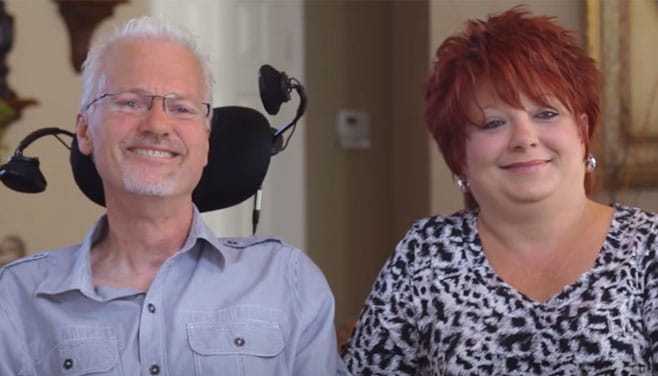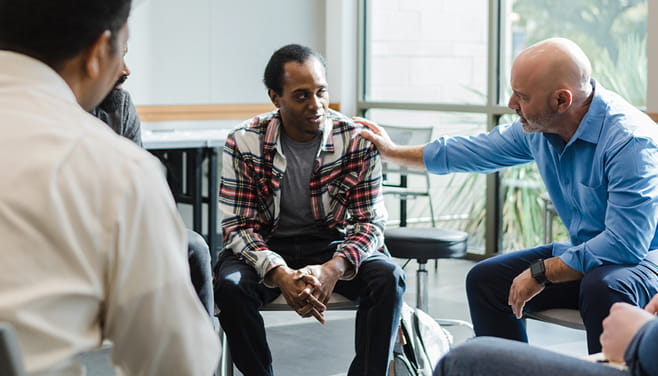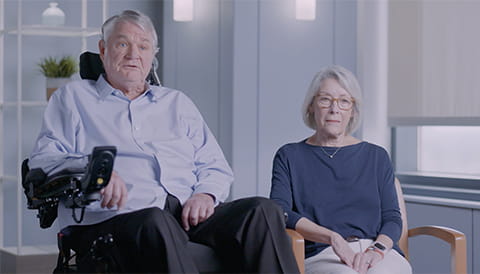About ALS
U.S. PATIENTS:713.441.3760
Find a Specialist Near You
Houston Methodist is home to the nation’s first multidisciplinary ALS Clinic . The compassionate specialists who comprise “Team Hope” offer innovative, personalized care to patients from throughout the U.S., in collaboration with the Muscular Dystrophy Association (MDA) and the ALS Association (ALSA).
Amyotrophic lateral sclerosis or ALS (also known as Lou Gehrig’s disease or motor neuron disease) is a neuromuscular disorder that causes muscle weakness and interferes with a patient’s ability to function physically. The nerve cells that control movement of muscles gradually die and muscles progressively weaken and atrophy.
Symptoms vary among patients and grow more severe over time. Early diagnosis is key to preserving function and quality of life — the more we know about your condition, the better we can customize your care plan.
Symptoms of ALS
ALS causes loss of upper and lower motor neurons — nerve cells that project from the brain to the spinal cord and from the spinal cord to the muscles. Approximately 20% of patients first notice reduced ability to speak. Muscle weakness eventually becomes the most intense symptom.
Over time, patients may experience a range of symptoms that progressively become worse:
- Cramps in arms, shoulders and tongue
- Difficulty holding their head up or maintaining good posture
- Trouble walking
- Twitching in the arms and legs
- Limited dexterity in the hands
- Weakness in legs, feet or ankles
- Slurring of speech or trouble swallowing
Pain is uncommon with ALS, and the condition usually does not affect cognition, the senses, sexual function or bowel and bladder control. However, ALS slowly diminishes the ability to control the muscles used to move, speak, eat and breathe. Most patients experience progressive muscle weakness over a three-to-five-year time frame.
ALS Education for Patients & Families
What causes ALS?
Most cases appear to develop sporadically. Approximately 90-95% of patients have no immediate family history of ALS. Current studies suggest sporadic ALS may develop due to abnormal proteins in nerve cells, an autoimmune condition or an overabundance of the neurotransmitter glutamate, which can become a neurotoxin. All these factors may inflame and destroy neuron cells. Environmental factors that might increase the risk of ALS include smoking, lead exposure and service in the military.
About 5-10% of ALS cases may be familial (inherited). In 80% of these patients, a specific gene mutation is not identified. An estimated 20% of patients with familial ALS have a gene mutation on chromosome 21.
How is ALS diagnosed?
In its early stages, ALS can mimic other neurological conditions. A neurologist who specializes in ALS can provide an accurate, timely diagnosis.
First, the neurologist will discuss your medical history, including your family and personal health history. Then we will conduct a physical and neurological exam, an MRI and a blood, urine and thyroid hormone test to rule out other underlying conditions.
To confirm an ALS diagnosis, we will conduct two neuromuscular tests:
- An EMG will evaluate the electrical activity of your muscles at rest and in contraction. The EMG can detect involuntary movements, spontaneous twitches and reduction of voluntary motor function. It can also show us where healthy neurons exist to potentially reinnervate damaged neurons.
- A nerve conduction velocity study will measure how well your nerves send impulses to other areas of the body, which can show us areas of nerve damage. Slower transmission speeds can indicate ALS or another neurological condition.
Combining these various data points requires investigative and neurological expertise. Team Hope includes experts in both — we are here with swift, compassionate support from diagnosis through symptom management.
What treatment options are available?
Though there is not yet a cure for ALS, there are comprehensive therapies to manage symptoms and improve your quality of life. ALS is a full-body condition, and Houston Methodist offers integrative treatment plans that cover physical, neurological and emotional health needs.
Medication
Riluzole can help slow the progression of ALS. In some patients, it can reduce the levels of toxic glutamate in the brain. Anti-inflammatory medications can relieve joint discomfort and strain caused by muscle weakness. ALS can cause emotional outbursts, such as crying or laughing — medications are available to control these symptoms.
Exercise and Behavioral Modifications
Team Hope’s physical, occupational and speech therapists specialize in neuromuscular disease management. We will recommend an ALS therapy plan tailored to your symptoms and abilities. Your care plan may include:
- Aquatic exercises
- Breathing exercises
- Frequently changing position to avoid joint and tissue strain
- Hand and limb strengthening movements
- Riding a stationary bike
- Speech-language techniques for swallowing
- Stretching
- Walking on even surfaces
To avoid injury, weightlifting and resistance training are not advised. Many patients with ALS require communication assistance. Items such as tablets, laptops and erasable boards can help you express yourself more clearly.
Small daily lifestyle changes can dramatically improve independence and emotional well-being. For example, wearing clothing with Velcro, button hooks and zipper-pull fasteners can reduce frustration surrounding getting dressed. Using mobility devices such as a cane, walker or wheelchair can help eliminate falls. Wearing adaptive devices, such as ankle- and foot-stabilizing orthotics, also can minimize falls and maximize endurance.
Respiratory Support
ALS can cause issues with breathing and swallowing. Our ALS experts offer customized care, including:
- Treatment of respiratory infections
- Supplemental oxygen for low blood oxygen levels
- Aspiration risk management in patients with swallowing difficulties
- Medication to help decrease excessive saliva or phlegm
- Nutrition guidance and support
- Vitamin supplementation (such as E, C and beta carotene)
Over time, your symptoms and support requirements will change. Working closely with Team Hope offers you and your family the best chance to notice and capitalize on therapy modification opportunities as they arise.





